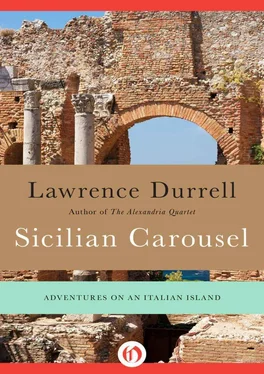The Greek temple implicated the whole of nature in its magical scheme — the world of animals as well as Gods. The notion of value was twofold, namely, material gain and also a degree of beauty which enslaved and ennobled, which enchanted and enriched on the spiritual plane. But how inadequate words were when it came to trying to point up the difference between these two degrees of excellence. There was, however, a continuity between the Greek temple with its ex-votoes and the modern Christian or Orthodox Church with its same pathetic objects of gratitude or propitiation. And the notion of beauty worshipped in icons, in paintings, in holy relics. One thinks of the golden statue that Cicero found “beslubbered by the kisses of the faithful who loved its unique beauty”; today the icon is still kissed, but not for its beauty. For its power.
Martine took the idea and played with it for a while, making fun of my woolliness and vagueness — it is impossible to be too precise, for so many fragments of the jigsaw are missing. Everything is supposition.
But we have had enough experience now of the thought schemes of savages to be thoroughly on our guard when it comes to trying to imagine how primitive peoples think, how they associate. Were the ancient Greeks, with their highly organized and, to them, very logical superstitious systems, any different? I don’t think so. Why, the notion of gold being valuable may well have come from the first golden Aryan head which the Greeks saw, with its marvelous buttercup sheen. The men went mad over this hypothetical girl — Circassian or Scythian or British perhaps? Gentlemen preferred blondes even then, so it became necessary to manufacture golden wigs, or tresses of beaten filigree gold as a head ornament. We know that prostitutes in ancient Athens were forbidden by law to imitate the blandishments of respectable married women by wearing rich gold ornaments, fillets, or clips, in their hair. That is probably why they set about finding cheap dyes in order to effect a transformation that was legitimate. They tried saffron and, like the modern Egyptian of the poorer classes, common soap with its strong bleaching agent. The story of Goldilocks. A theory of how beauty came to be evaluated. But where, then, did the metal come into this scheme of things? These matters we used to argue to the point of sheer irritation with each other. In one of her letters she records our violent disagreements.
I couldn’t help thinking of you and your wretched relativity notions the other evening when I went to see Loftus Adam who now lives here, just down the coast from me. He too said how irritated you made him by trying to subject everything to the merely provisional: and all truth as subject to scale. Yet he himself at last admitted that if you selected your coordinates you could prove anything from any evidence; he wants to write a modern history of Europe based on three coordinates, namely the moustaches of Hitler, Marinetti, and Chaplin, which have formed our unhappy age. They were all the same little smudge moustache which must prove something. And between them the new European sensibility was forged and founded. It sounds highly fanciful but why not? He is going to call the book The Moustache; and Why .
I went to sleep quite late that night and had a dream in which I recovered the name of the philosopher which had escaped her — the great Empedocles who was a native of the town and around whose name and memory gathered so many tales of necromancy and witchcraft as to almost obscure his real fame as a philosopher as eminent and as fruitful as any of the great men of his time. Is it nothing to have won the respect of Aristotle, or to have influenced Lucretius? Moreover, enough of his system remains extant today for our scholars to evaluate and describe. Why has he been written off as a mythomane? In the case of Bertrand Russell the reason is plain; great as Russell is, he was, in the affective and intuitional sense, colorblind. He is no poet but a geometer. And it was inevitable, given the type of temperament that was his, that he should be as unfair to Plato as he was to Empedocles. Then one recalls the gibes and sneers of Epicurus when he referred to Plato’s attempts to systematize reality and to comprehend nature. To him everything that Plato beheld was the purest illusion, the purest self-deceit. He believed in a world which held no mysteries and in consequence no great dangers. Temperamentally Empedocles lies on a tangent between the absolute behaviorism of one and the pure subjective vision of the other. To each his truth, and qui verra vivra to adapt the phrase to suit philosophers who are also visionaries (charlatans to the Russells of this world and the last). The two functions, however, the two arts of deduction and of intuitive vision must be complementary at some remove. Plato to Aristotle, Freud to Jung.… In this sharp diversity is born the marriage of true minds.
For Empedocles also the world was arranged in not too mysterious a fashion, though it was far from an impulse-inhibition machine run by invisible and soulless engineers. One could best comprehend it as a sphere ceaselessly agitated by two primordial impulses or dispositions which in turn acted upon four primary roots of all being — fire, air, water, earth. This joining and separating motor (the Love and Strife machine) in its quite involuntary convulsions manipulated matter and shook it out in a million differentiated patterns and mixtures like a kaleidoscope shakes out pictures at the slightest jog. The arch movers of all process were Love and Hate — the joining and separating impulses. The domination of one or the other produced quite recognizable effects in nature, alloys of the four basic elements. It seems fair enough.
The original condition of matter was to be envisaged as a sphere in which Love played the dominant role and where the four basic elements were perfectly accorded and mixed. Into this primordial harmony entered the principle of Strife, which set off the whole dance of process and foxed up the original harmony of things. First air became separated, then fire, then earth — the motion acted like a milk separator, forging unexpected unities and dissonances; and the effects of these changes were reflected in every department of man’s life and thoughts. Quantity was all-important — a hint perhaps of a Pythagorean influence? The present world — the world he knew and which has not noticeably changed since his time — is a theater where Love is being everywhere assailed by Strife; and where Strife becomes dominant species and sexes become separated, lose their coherence and identity — it is matter in a state of hysteria. But at the other end of the cosmic seesaw — for the gain of one element turns to loss by over plus and gives ground to its opposite — the overwhelming force of undiluted love could bring about bizarre physiological changes in nature. Empedodes, in his vision of the disorder brought about by the mixture of unequal quantities of the four elements, speaks about separate limbs being begotten, arising and walking around, as in the canvases of Dali; hands without shoulders and necks, bodies without hands. And all sorts of singular combinations like oxen with human heads, fishes with breasts, lions with hands, birds with ears.… A chaos of undifferentiated forms ruled.
But nature aspired to the functioning rule of the sphere, and only the sphere mixed the elements rightly, in the proper proportion and harmony. Yet the slightest push from one side or the other and one got an imbalance in nature which only hazard could redress. This then was the reality of things as we were living it, for we were part and parcel of the whole convulsion, our thoughts and feelings were all influenced by it. As for thought, Empedocles was convinced that we think with our blood, and more especially with the blood around the heart, because in the blood here all the elements are more correctly fused than in other sectors of the body. What is endearing, and indeed peculiarly modern, is his interest in embryology and in the growth systems of plants; whenever possible he drew his analogies from this department of knowledge. For him thought and perception were materially functions of our bodily constitution. All this was down to earth, was perfectly functional, was the fruit of sweet reason and not of fantasy; somewhere at heart he was temperamentally akin to Epicurus.
Читать дальше











